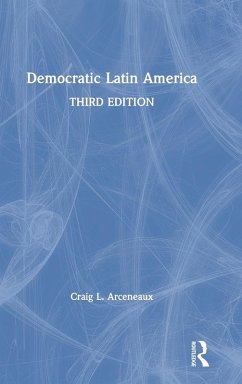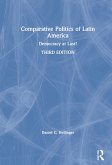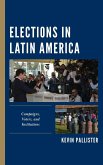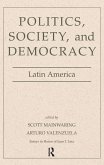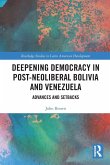The third edition of Democratic Latin America retains its classic institutional approach to understand contemporary Latin American politics. Each chapter focuses on a different institution and compares how they are constructed differently across countries. Placing a premium on accessibility, the chapters open with a story and end with a detailed country case study, making use of contemporary examples to feed student interest in current events, with comparison-based tables and box features interspersed throughout to stimulate analysis. Every chapter finishes with a set of questions and recommended readings. This approach allows for a very practical approach to politics that encourages critical analysis. Updates to this new edition include: updated comparison-based tables and box features to stimulate analysis; new "Country in the Spotlight" to include developments unique to each country; and discussions on political change in Cuba, indigenous peoples and political power, neopopulism, impeachment procedures, transitional justice, the 2019 protests, the new militarism, the mobilization of women against violence, LGBT rights, the evangelical movement, and the Colombian peace process. A clear-eyed look at political institutions to provide a roadmap to the political activity in a country, Democratic Latin America continues to offer an original way of teaching and learning about Latin American politics.
Hinweis: Dieser Artikel kann nur an eine deutsche Lieferadresse ausgeliefert werden.
Hinweis: Dieser Artikel kann nur an eine deutsche Lieferadresse ausgeliefert werden.
"This updated and expanded edition of Democratic Latin America remains the best textbook available on this important region. Its focus on institutions, joining of concepts with country cases, and coverage of 18 countries makes it an unparalleled teaching tool, while its superb organization and writing style makes it extremely accessible to students."
David Pion-Berlin, Professor of Political Science, University of California, Riverside
"Ever since I first had the opportunity to review the first edition of Democratic Latin America by Craig L. Arceneaux there has not been a textbook for any of the regions I teach that I am more excited about. It provides a thorough overview of all the major institutional dynamics that you would want students to understand, while also providing detailed examples from individual countries. The latest edition includes valuable new discussions of the peace accords in Colombia, political changes in Cuba, the recent surge in protests all over the region (especially Chile), new examples of executive removals and impeachments, and the evangelical movement. A particularly useful addition is the discussion of neo-populism in Latin America, reflected in the recent elections of Lopez Obrador in Mexico and Bolsonaro in Brazil. Arceneaux provides a thorough overview of the concept of populism and explores its unique Latin American features as well as the characteristics of the current wave of populism in the region."
Eduardo Magalhães III, Professor of Political Science, Simpson College
David Pion-Berlin, Professor of Political Science, University of California, Riverside
"Ever since I first had the opportunity to review the first edition of Democratic Latin America by Craig L. Arceneaux there has not been a textbook for any of the regions I teach that I am more excited about. It provides a thorough overview of all the major institutional dynamics that you would want students to understand, while also providing detailed examples from individual countries. The latest edition includes valuable new discussions of the peace accords in Colombia, political changes in Cuba, the recent surge in protests all over the region (especially Chile), new examples of executive removals and impeachments, and the evangelical movement. A particularly useful addition is the discussion of neo-populism in Latin America, reflected in the recent elections of Lopez Obrador in Mexico and Bolsonaro in Brazil. Arceneaux provides a thorough overview of the concept of populism and explores its unique Latin American features as well as the characteristics of the current wave of populism in the region."
Eduardo Magalhães III, Professor of Political Science, Simpson College

